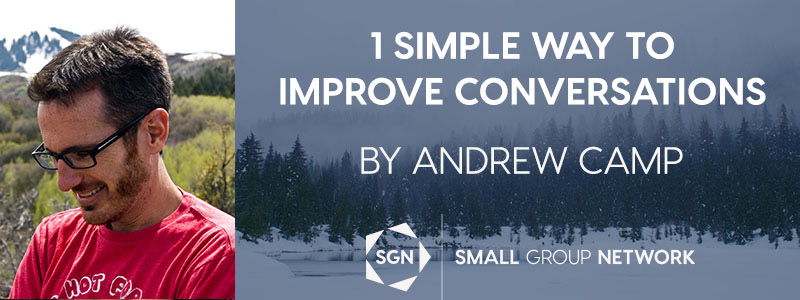
We have all been there. You are sitting in your small group; a member shares a vulnerable story of what is happening in his/her life. The room falls quiet as people try to figure out what to say. In desperation, another person replies with a story of his/her own, which typically begins in this manner, “That reminds me of a situation that happened to me.”
The truth is we have all done this, probably too many times to count. When another person shares an emotional story in our presence, we tend to get uncomfortable, so we resort to talking about what is most comfortable: ourselves. Instead of truly empathizing with the other, we turn the conversation to focus on us. Rarely does this help the person who originally shared the story. A person shares a story not to be compared to by other people, but simply to be affirmed and heard how difficult a situation he finds himself in.
In her book, We Need to Talk, Celeste Headlee refers to this as conversational narcissism: “the desire to take over a conversation to do most of the talking, and to turn the focus of the exchange to yourself. It is often subtle and unconscious” (page 105).
Unfortunately, this tendency of ours seems to be hard-wired into our brains, according to Headlee. When we hear a story, our brains automatically start searching through our own memories for a story that is similar. This is good because it can form the basis for empathy. The problems, as already noted, is when we share that story, deflecting attention from the other to ourselves.
So how do we allow and teach others to allow these memories to genuinely empathize with others and not become narcissistic conversationalists?
Drawing on other’s insights, Headlee offers one easy way to do this: distinguishing between a shift response and a support response.
In a shift response, we shift the attention to ourselves after a person has shared, whereas in a support response we acknowledge and want to learn more about what the person just shared. For example:
Shift Response:
Person A: I feel like God does not hear my prayers.
Person B: I remember feeling like that recently as well. [Person B continues sharing.]
Support Response:
Person A: I feel like God does not hear my prayers.
Person B: That sounds really difficult. Can you explain what you mean some more? [Person B allows Person A to share more.]
Again this cuts against our normal tendencies, but encouraging people to respond in a supporting manner versus a shifting manner can transform our conversations not only in our small groups, but as we work and talk with anyone and everyone.
As a small group point person, in the next week or so, I challenge you to notice how often you use a shift response versus a support response. We might be all amazed at how much we are narcissistic conversationalists.
Author
-
Andrew Camp has an MA in Spiritual Formation and Soul Care from Talbot Seminary. He is also a professionally trained chef, most recently as the sous chef at Silver Restaurant in Park City, UT until it closed in 2015. Since then, he has served as the Spiritual Growth Pastor at Mountain Life Church in Park City. He and his wife, Claire, live just outside of Park City with their two young daughters, Hazelle and Hannah.
View all posts





